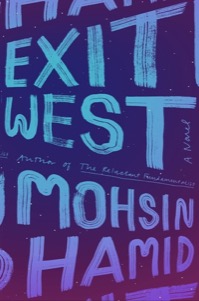Exit West focuses on a young couple—Saeed and Nadia—and their life together first in a city overrun by militants. It follows them as they flee and try to find new lives in a world that seems to neither want nor welcome them. It’s not the most encouraging picture of humanity, but it’s too important to overlook and the novel is incredibly timely.
In the novel, magical doors appear that can transport people from one place to the next. The doors pop up at random. It’s never clear whether a door will be safe or who will be waiting on the other end. In this way, the doors work pretty well as a symbolic representation of the reality of refugees fleeing their homeland in search of something better.
I kept thinking about The Lightless Sky and Gulwali’s accounts of how harrowing and risky the methods of passage were. People try to take advantage of the refugees, lie to them, cheat them—you never know if in fact the doors of opportunity that open are going to lead to something better or not. The magical doors in Exit West share a similar uncertainty. I have heard a few folks struggle with the idea of a magical element being introduced into a novel otherwise devoid of anything fantastical, but it didn’t bother me. The magic of the doors is subdued: you get the sense they exist perhaps entirely so that Hamid can fast-forward past the journey and focus on what happens after the journey is done.
That’s the core of the story: the day-to-day reality of migrants. It’s so easy for us to overlook the incredible burden of trying to make a new home in a place where you are unwelcome and unwanted, but we see it here.
Saeed and Nadia’s relationship starts out strong and sensual. But with each escape, they are forced to leave people they care about behind, as well as parts of themselves. As Hamid poignantly writes, “..when we migrate, we murder from our lives those we leave behind.”
As these relationships fade into the past, and Saeed and Nadia are surrounded by hate from others, their own relationship begins to wither and deteriorate as well. When all you’re faced with is hate, it becomes harder and harder to love.
Long story short: this novel had all the makings of an incredibly poignant and powerful story. Unfortunately for me, the story never quite hits those lofty expectations.
I struggled to connect with the characters. They never felt fully fleshed out. As a result, there were many moments where rationally I recognized should be powerful, but emotionally they didn’t register much.
I suspect this was not an issue of the characters themselves and how they were portrayed, but rather a symptom of a bigger issue I struggled with: the writing style. Hamid loves to use run-on sentences. A lot. I’ve read many books where the author makes some sort of stylistic decision like this (Cormac McCarthy strips out punctuation, José Saramago’s Blindness features characters with no names, etc) and most of the time I find after a few pages I stop noticing as it fades into the story.
That never happened for me with Exit West. Occasionally the style worked. At its best, these run-on sentences create a breathless stream of thought that is almost lyrical. But for the most part, the style distracted me from the story. The run-on sentences are used so often and I kept finding myself being pulled back out of the story.
This won’t bother many people, and that’s good. The style didn’t work for me, but your mileage may vary.
If you do the style distracting as well, I would suggest reading The Lightless Sky for a powerful true account of the challenges faced by refugees.
